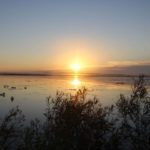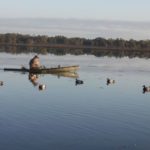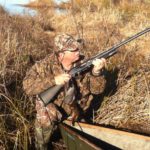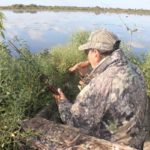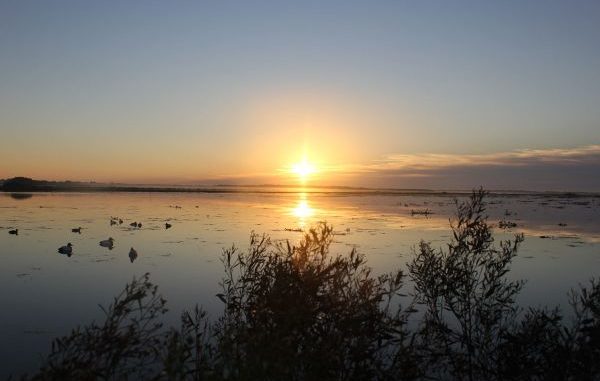
Duck hunting changes this month, with birds often rafting up in open water. Instead of giving up and going back to work, change your late-season tactics and continue stacking up ducks.
The promise and optimism of the duck season had faded as fall transitioned into winter.
The bands of teal that made easy early season limits and the gray ducks that rode in on each successive cold front had vanished.
The marsh was brown and barren. Where lush duck food once grew, only exposed mud flats remained.
This bleak panorama was enough to make most duck hunters hang up their shotguns for the year.
But for some hunters, the real duck season was just about to begin — with the best days still ahead.
The hordes of early season hunters had dwindled, so the remaining hunters would practically have the marsh to themselves.
However, they would not be heading to the ponds they hunted in November. Instead, they would be moving to the lakes and lagoons, where large concentrations of ducks gathered in safety, far away from hunters’ guns.
These were seasoned ducks, but so were the hunters.
These hunters knew that a different strategy and special tactics were necessary late in the season, and the challenge brought smiles to their faces and motivated them to rise out of warm beds to face the bitter conditions of January.
If you would like to be considered part of this elite group of hunters, and have the will and perseverance to do so, you might want to listen to advice from some experts to help fill your late-season limits and finish strong.
Here are some experts’ tips for continuing to kill limits right up until the day the feds kick you out of the blinds until next season.
Stay mobile
At the young age of 5, Capt. Nash Roberts IV began tagging along on hunting trips with his father and grandfather, Nash Roberts Jr., the legendary New Orleans meteorologist.
The youngest Roberts was not allowed to shoot a gun at that age, but just being there was enough for him to fall in love with the sport — and he has been duck hunting ever since.
“I am 44, so I guess I have been duck hunting for almost 40 years,” he said.
Roberts spends most of the season hunting on the east bank of Plaquemines Parish in the Caernarvon, Delacroix and Reggio areas, but he also is a member of the Avoca Duck Hunting Club near Morgan City, and he also ventures to West Louisiana and Arkansas each year.
In duck hunting circles, Roberts is known as one of the best duck hunters in the area.
Roberts — now a fishing guide — loves putting his fishing charter clients on trout and redfish, but his passion is pursuing ducks, which he does for more than 45 days each 60-day season.
His drive and competitive nature are well suited for duck hunting, and his obsession is evident when you speak to him.
He doesn’t turn back to fishing in the final month of the season. But he does adjust.
“If you want to kill ducks late in the season, you have to do things differently,” Roberts said. “Most hunters are doing the same things they were doing on opening day. That’s just not going to work, in most cases.
“I have had some of the best duck hunts of the year late in the season, but you have to work hard at it.”
Roberts is a firm believer in scouting all during the season, but even more so in its waning days.
“I use binoculars and observe ducks, and see where they are feeding and resting,” he said. “I look to see if they are mixed in with coots, if they are near mud flats or in deeper water.
“With this information, I will decide how I will hunt them.”
His is a mobile approach.
“I move around quite a bit, using bushes and willows that I cut for my blinds,” Roberts said. “I cut a lot of bushes during the season.”
He also has formed a network with other hunters in the areas he hunts, and they share information with each other to stay on top of the best areas to hunt.
Roberts said that as the season wears on ducks tend to gather in large rafts in open water.
And he has a special strategy when they do.
“I will find where they are rafting up and set up in the middle of open water in my duck boat using water hyacinth and bushes as camouflage, and make sure to keep a very low profile,” Roberts said.
Open-water hunting means his spread has to be pretty large.
“I usually use 50 to 60 decoys, but have used up to 150 on occasion,” Roberts said. “I like to use gray duck, coot and pintail decoys.
“This set-up can be deadly, especially late in the year.”
